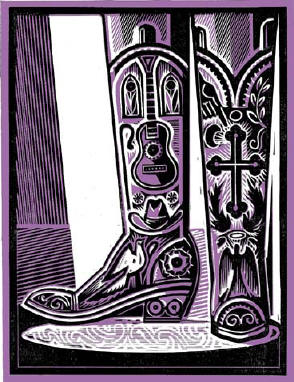|
RELIGION
IN THE NEWS |
|
|
Table of Contents Fall 2003
Quick Links: From the Editor:
Special Supplement: The Social Gospel Lays an Egg in Alabama Mel Gibson, the Scribes, and the Pharisees Gibson and Traditionalist Catholicism
|
The Religion of Country
There’s always been a lot of piety in country music—tearful prayers, salutes to God-fearing parents, and even occasional mention of coming to know Jesus are commonplace. But in recent decades, it has almost always been songs with a highly generalized form of piety that get a hearing. As insiders (but not most listeners) have known, there has been a well-policed boundary between country music and “Christian music,” which carries an explicitly and often narrowly evangelical Christian message. “Labels and radio were always a little concerned about getting TOO religious and . . . offending a segment of the audience” Radio & Records’ Lon Helton told Miami Herald reporter Howard Cohen on July 2. The assumption in much of the country music programming world is that products that are too narrowly evangelical are decidedly unpopular—that is, limited in appeal to a narrowly defined market niche—and songs that get too preachy are unlikely to get much airplay. It’s also a boundary that is actively defended. On September 27, 2002, the Associated Press reported that the Country Music Association (CMA) had filed a federal lawsuit accusing the Christian Country Music Association (CCMA) of trading on its name. Almost a year later, CCMA president Gene Higgins responded in a press release carried by the PR Newswire: “There are several associations and organizations that use the marks, ‘CCMA’ and the CMA have not, to our knowledge, filed suit against any of these businesses.” Only the Christian Country Music Association was targeted by the lawsuit. Why? According to Higgins, the complaint alleged that promoting Christian Country Music Association Awards as the “CCMA Awards” created a “likelihood of confusion . . . among consumers, the media and the industry.” A boundary was getting fuzzy. And the tension goes both ways. When Christian performer Amy Grant began recording and releasing secular music, she was perceived by many in the contemporary worship camp to have “sold out." “Spiritualism has long been a part of the format,” Bob Barnett, program director for WKIS-FM 99.9 in South Florida reminded readers in a July 2 Miami Herald story by Howard Cohen, but it’s a generic, civil religious spirituality—that is, “country with a red, white and blue capital ‘C,’” as noted by Dayton Daily News writer Carol Simmons in a June 5 response to Dixie Chick Natalie Maines’ anti-Bush jab. “I would look at it like a four-legged stool,” Barnett continued. “The top platform is the country format but the legs are represented by spirituality, family values, patriotism and respect for legends.” “There is doubtless a new mood after 9/11 and Iraq war among the ‘red state’ Americans who make up country music’s audience, one in which faith, along with patriotism, takes center stage,” Gene Edward Veith wrote in the June 21 World Magazine. The aggressively patriotic songs that hit the charts in the immediate aftermath of 9/11 sang the nation’s battle cry in the “war on terror.” Now the mood is more reflective, and country musicians are wrestling to make sense of recent events even while reaffirming faith in a benevolent God. Randy Travis’ hit is a story song about hope in the face of tragedy. The three wooden crosses are roadside memorials to the victims of a bus accident. One of the victims, a preacher, gives his Bible to a fellow passenger, a prostitute, in his dying moments. She survives the crash and reads from that bloodstained Bible to her son, who grows up to become a preacher. The images are powerful—wreckage, a dying preacher, a reformed prostitute, three roadside crosses, the Bible—but equally powerful is the story’s assurance that everything happens for a purpose. Similarly, in Walker’s A Few Questions, which evokes the story of Job, the singer raises questions about the way God runs things but ultimately returns to a position of faith: An’ why did my cousin have to die in that crash? Consider also popular releases by Dolly Parton and Phil Vassar. Parton made her first appearance on the charts in a decade with Hello God, in which she questions God: “are you out there…are you listenin’ anymore?” A scolding God replies in Vassar’s This is God: “You fight each other in my name…look at what you do to the world that I created.” Is country music becoming more religious? Probably not. Notably, as reported in Mansfield’s USA Today story, programmers didn’t notice the surge in expressions of piety in country songs until journalists began asking questions about it. Popular piety is a taken-for-granted part of the genre. However, as noted by Tom Baldrica, BNA vice president of promotions, in Mansfield’s report, songs that are too overtly religious will be weeded out by station programmers. “It won’t get to the point,” Baldrica said, “where country music…listeners will think they’ve tuned into ‘The Good-Time Gospel Hour.’”
|
 In June, journalists
registered a surge of popular piety in country music. Randy Travis’ song
Three Wooden Crosses soared, unexpectedly, to the top of the
Billboard country music chart—the first single from a Christian record
label to do so—and an article by Brian Mansfield in USA Today on June
4 counted at least 10 songs with more-or-less explicit religious content on
the country music charts.
In June, journalists
registered a surge of popular piety in country music. Randy Travis’ song
Three Wooden Crosses soared, unexpectedly, to the top of the
Billboard country music chart—the first single from a Christian record
label to do so—and an article by Brian Mansfield in USA Today on June
4 counted at least 10 songs with more-or-less explicit religious content on
the country music charts.